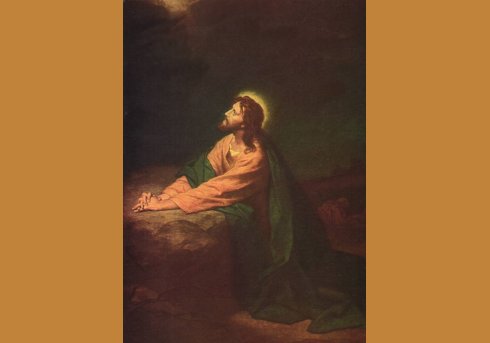
Station Nine
Luke 22:39-44
Jesus went out as usual to the Mount of Olives, and his disciples followed him. On reaching the place, he said to them, “Pray that you will not fall into temptation.” He withdrew about a stone's throw beyond them, knelt down and prayed, “Father, if you are willing, take this cup from me; yet not my will, but yours be done.” An angel from heaven appeared to him and strengthened him. And being in anguish, he prayed more earnestly, and his sweat was like drops of blood falling to the ground.
Matthew 26:36-44
Then Jesus went with his disciples to a place called Gethsemane, and he said to them, “Sit here while I go over there and pray.” He took Peter and the two sons of Zebedee along with him, and he began to be sorrowful and troubled. Then he said to them, “My soul is overwhelmed with sorrow to the point of death. Stay here and keep watch with me.”
Going a little farther, he fell with his face to the ground and prayed, “My Father, if it is possible, may this cup be taken from me. Yet not as I will, but as you will.”
Then he returned to his disciples and found them sleeping. “Could you men not keep watch with me for one hour?” he asked Peter. “Watch and pray so that you will not fall into temptation. The spirit is willing, but the body is weak.”
He went away a second time and prayed, “My Father, if it is not possible for this cup to be taken away unless I drink it, may your will be done.”
When he came back, he again found them sleeping, because their eyes were heavy. So he left them and went away once more and prayed the third time, saying the same thing.
Hebrews 5:7-10
During the days of Jesus' life on earth, he offered up prayers and petitions with loud cries and tears to the one who could save him from death, and he was heard because of his reverent submission.
Although he was a son, he learned obedience from what he suffered
and, once made perfect, he became the source of eternal salvation for all who obey him
10 and was designated by God to be high priest in the order of Melchizedek.
Three times Jesus earnestly asked God, “My Father, if it is possible, may this cup be taken from me.” Jesus didn't want to go to the cross and die. The thought caused him great anguish. God heard these anguished prayers but said, “No.” Because Jesus was willing to be obedient-to hear “no” from his father-then God's better will was done. It was through saying “no” to his son that God brought about victory over sin and death. It was through Jesus dying, that death was defeated. It was because Jesus was willing to say, “Not my will but yours” that God's surprising, miraculous, unbelievable outcome could be accomplished. What requests have you made to which God said, “No?” Is it possible that He might have some astonishing conclusion in store for you?
Charles Spurgeon, the prince of preachers, leads us to pray like Christ:
O, dear Savior, be not impatient with us, but still school us at your feet, till at last we shall have learned some of the sublime lessons of self-sacrifice, of meekness, humility, fervor, boldness, and love which your life is fit to teach us. O Lord, we beg you, mold us into your own image. Let us live in you and live like you.
Charles H. Spurgeon (1834-1892) - English Baptist minister and biblical expositor



